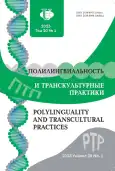What’s In A Russian English Username? A Case Study of Social Media Accounts Names
- 作者: Lebedeva I.L.1
-
隶属关系:
- Lomonosov Moscow State University (MSU)
- 期: 卷 20, 编号 1 (2023)
- 页面: 146-156
- 栏目: Polylingual Texts
- URL: https://journal-vniispk.ru/2618-897X/article/view/326722
- DOI: https://doi.org/10.22363/2618-897X-2023-20-1-146-156
- EDN: https://elibrary.ru/VGNYNP
- ID: 326722
如何引用文章
全文:
详细
The present paper examines social media account usernames of Russian speakers of English. It aims to classify over a hundred Russian English usernames (collected between 2016–2021) in terms of their structure, typical linguistic features as well as translingual and transcultural patterns that underpin their creation. This paper argues that Russian speakers of English consciously and / or subconsciously creating their usernames employ a number of translingual and transcultural strategies and practices that are aimed at retaining and transmitting Russian linguacultural identity within such global multicultural English-dominated domain as international social media. Apart from signalling Russian identity of their owners, the analyzed usernames demonstrate that Russian social media users being bilingual en masse (at least, at a graphic level), do draw on Russian English for communication within the landscape of this social media thus facilitating further formation of the social media Russian English.
作者简介
Irina Lebedeva
Lomonosov Moscow State University (MSU)
编辑信件的主要联系方式.
Email: lebedevamsu@yandex.ru
ORCID iD: 0000-0002-1144-0736
PhD, Associate Professor for the Department of Foreign Languages and Area Studies
1 Leninskie Gory, bld. 13-14, Moscow, 119991, Russian Federation参考
- Kachru, B.B. 1985. Standards, codification and sociolinguistic realm: The English language in the Outer Circle. In: Quirk R. & H.G. Widdowson (Eds.). English in the World. Cambridge: Cambridge University Press: 11–30. Print.
- Lee, J.Sh. (Ed.) 2020. World Englishes and Digital Media. Special Issue. World Englishes. Journal of the International Association for World Englishes, 39 (1). Print.
- Hilgendorf, S.K. 2020. Euro-Englishes. In: C. Nelson, Z.G. Proshina & D. Davis (Eds.). The Handbook of World Englishes (2nd edn.). Hoboken, NJ, USA, Wiley-Blackwell: 215–231. Print.
- Proshina, Z.G. & Eddy A. (Eds.), 2016. Russian English. History, Functions, and Features, Cambridge, Cambridge University Press. Print.
- Proshina, Z.G. 2020. Russian Englishes. In: C. Nelson, Z.G. Proshina & D. Davis (Eds.). The Handbook of World Englishes (2nd edn.). Hoboken, NJ, USA, Wiley-Blackwell: 232–247. Print.
- Proshina, Z.G., and A.A. Rivlina 2018. Mock Russian English: shutlivo-parodijnoe ispol’zovanie russkogo varianta anglijskogo jazyka v stranah vnutrennego kruga. Vestnik MGU, Ser 19: Lingvistika i mezhkul’turnaja kommunikacija 19 (3): 18–30. Print. (In Russ.).
- Aleshinskaya E., Gritsenko E. 2017. Language practices and language ideologies in the popular music TV show The Voice Russia. Language & Communication, 52: 45–59. DOI: https://doi. org/10.1016/j.langcom.2016.08.005
- Rivlina A.A. 2020. Bilingual language play and world Englishes. In: C. Nelson, Z.G. Proshina & D. Davis (Eds.). The Handbook of World Englishes (2nd edn.). Hoboken, NJ, USA: WileyBlackwell: 407–429. Print. DOI: https://doi.org/10.1002/9781119147282.ch23
- Lebedeva I.L. 2016. IRE: a hypothesis or a theory? Procedia — social and behavioral sciences, 236: 189–193. Print. DOI: https://doi.org/10.1016/j.sbspro.2016.12.063
- Lebedeva I.L. 2020. Teaching Russian Culture via English: Implications, Objectives and Challenges. RUDN Journal: Polinguality and Transcultural Practices, 17(4): 535–541. Print. DOI: http://journals.rudn.ru/polylinguality/article/view/25115
补充文件









